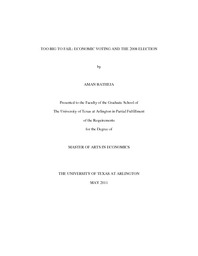
ATTENTION: The works hosted here are being migrated to a new repository that will consolidate resources, improve discoverability, and better show UTA's research impact on the global community. We will update authors as the migration progresses. Please see MavMatrix for more information.
Show simple item record
| dc.contributor.author | Batheja, Aman | en_US |
| dc.date.accessioned | 2011-10-11T20:48:27Z | |
| dc.date.available | 2011-10-11T20:48:27Z | |
| dc.date.issued | 2011-10-11 | |
| dc.date.submitted | January 2011 | en_US |
| dc.identifier.other | DISS-11241 | en_US |
| dc.identifier.uri | http://hdl.handle.net/10106/6158 | |
| dc.description.abstract | The onset of the worst economic downturn since the Great Depression just months before the 2008 presidential election is thought to have played a significant role in voting behavior. Yet the extent to which voters followed traditional economic voting patterns in choosing between Barack Obama and John McCain is less clear. Using exit poll data merged with state-level aggregate economic data, we search for evidence that negative shifts in economic status made voters more likely to support Obama. After controlling for various demographic, partisan, and geographic variables, we find that voters who believed that the economy was the top issue in the election were more likely to support Obama unless their state experienced a sizeable increase in real personal income per capita in the 6-12 months or year prior to the election. | en_US |
| dc.description.sponsorship | Desimone, Jeffrey | en_US |
| dc.language.iso | en | en_US |
| dc.publisher | Economics | en_US |
| dc.title | Too Big To Fail: Economic Voting And The 2008 Election | en_US |
| dc.type | M.A. | en_US |
| dc.contributor.committeeChair | Desimone, Jeffrey | en_US |
| dc.degree.department | Economics | en_US |
| dc.degree.discipline | Economics | en_US |
| dc.degree.grantor | University of Texas at Arlington | en_US |
| dc.degree.level | masters | en_US |
| dc.degree.name | M.A. | en_US |
Files in this item
- Name:
- Batheja_uta_2502M_11241.pdf
- Size:
- 475.5Kb
- Format:
- PDF
This item appears in the following Collection(s)
Show simple item record


